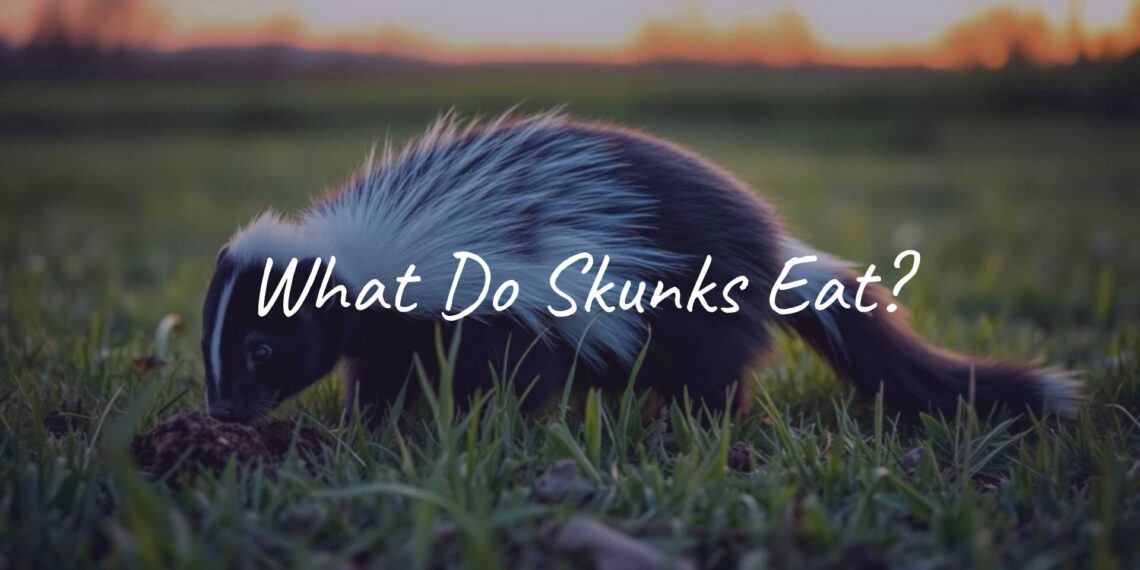Skunks are interesting animals, best known for their strong-smelling defense than for their eating habits. So, what do these black-and-white creatures actually eat? Skunks are true omnivores, which means they eat both plants and animals. Their diet changes based on what they can find, whether they live in a busy city or a quiet countryside. This ability to eat almost anything around them helps skunks live almost everywhere. They will eat insects, fruit, leftovers from humans, and more-skunks will take advantage of whatever food is close by.

Skunks have bodies built for finding food. Their strong front legs and long claws make it easy for them to dig up insects, grubs, and even some small animals that live underground. While their eyesight is weak, skunks have a very good sense of smell and sharp hearing, which they use to find food, even at night. Their stomachs can handle many different things, from hard insects to rough plants.

Skunks Eat Many Types of Food
Skunks are not picky. They enjoy both animal and plant foods. This lets them survive in many types of places, such as forests, fields, towns, and suburbs. Skunks change what they eat based on what is in season and what is easy to find. This is why you might see a skunk looking for bugs in a field one night and digging through trash cans the next.
Skunks have 34 teeth, including sharp canine teeth, which help them tear and chew many kinds of food. Their teeth and strong jaws let them eat things like beetles, fruit flesh, and sometimes even the bones of small animals. Skunks’ willingness to eat almost anything helps them survive and spread to new areas.
What Skunks Typically Eat in Nature
Wild skunks usually focus on whatever is easy to find and catch. What they eat depends on the time of year and where they live. In warm months, insects make up a big part of their meals because they are full of protein and easy to dig up. When the weather gets colder and insects aren’t as easy to find, skunks look for other foods.
Since they are active at night, skunks use their sharp sense of smell and hearing to find food. They aren’t very fast-usually running up to about 10 miles per hour-so they sneak up on their food instead of chasing it. Skunks are especially good at hunting bugs and animals that live in the ground.
15 Common Foods Skunks Eat
Skunks enjoy a wide range of foods, especially those high in fat and calories, which helps them store energy. Here are 15 foods skunks often eat:
- Insects: Beetles, crickets, grasshoppers, grubs, larvae, worms, snails, slugs, and honeybees (their thick fur protects against stings).
- Small Mammals: Mice, rats, voles, shrews, chipmunks, and ground squirrels.
- Eggs: Bird and chicken eggs.
- Small Birds: Especially from raided nests.
- Amphibians: Frogs and salamanders.
- Reptiles: Small snakes and lizards.
- Fruits: Berries (like elderberry, wild grapes, and cranberries), apples, melons, and other ripe fruit.
- Vegetables: Crops such as corn, carrots, peas, and squash.
- Nuts: Walnuts, pecans, hickory nuts.
- Seeds: Sunflower seeds and birdseed.
- Honey: Skunks destroy beehives for honey and bee larvae.
- Carrion: Dead animals found by chance.
- Garbage/Trash: Food scraps from humans.
- Pet Food: Cat or dog food left outside.
- Grasses and Leaves: Eaten if they can’t find other food.

| Category | Examples |
|---|---|
| Insects | Beetles, larvae, grasshoppers |
| Small Animals | Mice, shrews, chipmunks |
| Fruits | Berries, apples, melons |
| Vegetables | Corn, peas, carrots |
| Others | Eggs, honey, pet food, trash |
How Skunk Diet Changes with Age and Situation
Like many animals, what skunks eat changes as they get older and based on whether they live wild or as pets. Baby skunks need different food than adults, and pets rely on their owners to make healthy choices for them.
This shows how well skunks can adjust to new situations. They can move from drinking their mother’s milk to eating solid food in the wild, and some can live as pets with different diets. Knowing how skunks’ diets change helps both people who watch them in nature and those who care for them at home provide what they need.
What Do Baby Skunks Eat?
Baby skunks, called kits, start life eating only their mother’s milk for about six weeks. They are born blind and very small, needing this rich food to grow. Mothers usually give birth in spring or early summer, between April and June, when food is easier to find.
When the kits are around six weeks old, their eyes open and they begin to try solid foods. Their mother introduces them to different things to eat-fruits, vegetables, nuts, seeds, leaves, and grains-along with easy insects and even small animals like mice or eggs. If you see a baby skunk alone in nature, watch from afar and call wildlife rescue if the mother doesn’t return-baby skunks have special needs not met by normal pet food.

What Do Pet Skunks Eat?
Keeping a skunk as a pet means you need to pay close attention to its food. Wild skunks eat foods high in fat so they can survive cold months, but pets don’t need as much fat and can become overweight if they eat too much. Pet skunks should get lean proteins (like chicken or fish), cooked grains (oats, rice, potatoes), and a wide mix of fruits and vegetables. Leafy greens, corn, peas, carrots, and squash are good options.
Foods to avoid: asparagus (which can be dangerous to skunks), garlic, onions, chocolate, candy, processed meats, fatty foods, and canned cat food. Pet skunks often eat almost anything, so it’s up to their owner to give them healthy, balanced meals to prevent weight gain and health problems.
How Skunks Change Their Diet with the Seasons
Skunks change what they eat depending on the time of year. This helps them survive when some foods aren’t available. By eating what is easiest to find, skunks stay healthy in changing weather and different places.
Knowing how skunks’ meals change during the year helps people understand their place in nature and explains why skunks may turn up more often in some places at different times.
What Do Skunks Eat in Summer?
Summer is when skunks have plenty of food. During warm months, they mostly eat protein-rich insects like beetles, grasshoppers, crickets, and grubs, which they dig out of the ground. Skunks also hunt small mammals, raid birds’ nests for eggs and chicks, and capture frogs, salamanders, and small reptiles. Berries, fruit, nuts, and seeds are all popular summer foods. Skunks also sometimes raid beehives for honey and bee larvae, using their thick fur to protect against stings.

What Do Skunks Eat in Winter?
Winter brings less food. Skunks don’t fully hibernate, but they sleep more and move less. During mild spells, they come out to forage. In winter, skunks mostly eat what plant foods remain, such as certain berries, nuts, seeds, and any vegetables they find. If they can, they hunt small animals that are nesting or less active. Dead animals are another winter food source. Skunks near humans may eat more trash or birdseed when natural foods are harder to find.
Skunks and Human Environments
Skunks can live well near people, in towns and cities, as well as in the wild. They are smart at finding food humans leave behind, which helps them survive in city neighborhoods. While some people worry about skunks and their spray, these animals come close because our homes offer easy meals and shelter.
Skunks’ sense of smell helps them find leftovers, pet food, and garden crops in backyards and garbage bins. The way we handle food and trash can change what skunks eat and how often they visit. Understanding how skunks use these food sources can help avoid problems.
Do Skunks Eat Trash?
Yes, skunks will eat your trash if they can get to it. Skunks love high-fat, high-calorie snacks, and garbage cans, compost, and pet food outside are big attractions. They especially want strong-smelling items, such as old meat, but will eat almost any food waste. Spilled birdseed, fallen fruit, and unprotected gardens can also invite skunks.
To keep skunks away, keep trash bins closed tightly, feed pets indoors, clean up birdseed, and protect garden foods. Reducing easy food options is the best way to stop skunks from visiting too often.

















![What to with Scrap Metal? [infographic]?](https://facts-homes.com/wp-content/uploads/2019/07/645413-POPYOV-391-120x86.jpg)






